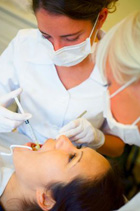 Judging by the increasing number of people in the UK who are suffering from dental cavities and gum disease, it would seem that the standards of oral hygiene are slipping. This is more than likely due to complacency when it comes to oral hygiene or even an ignorance of exactly what it takes to care for your teeth properly.
Judging by the increasing number of people in the UK who are suffering from dental cavities and gum disease, it would seem that the standards of oral hygiene are slipping. This is more than likely due to complacency when it comes to oral hygiene or even an ignorance of exactly what it takes to care for your teeth properly.
Many people seem to be under the impression that good dental care is just about brushing. There is no doubt that brushing your teeth well is the first line of defence against dental disease and decay, but it is far from the only preventative measure at our disposal. Brushing does remove more plaque and bacteria than any other form of cleaning, but unless you are flossing and using a tongue scraper, you are always going to be fighting something of a losing battle against dental disease. This is because bacteria and plaque often accumulate in areas that are difficult to reach with a conventional brush. These are areas such as the small gaps between the teeth and in the pockets between the teeth and the gum where they meet. Brushing will not remove this plaque and it is allowed to cause damage unchallenged.
Flossing will help to remove bacteria, making you less likely to suffer from dental problems. Tongue scrapers are ideal for removing food and bacteria from the small and moist groves of the tongue. The bristles of a toothbrush are not designed to clean the tongue and will leave bacteria to cause damage in other parts of the mouth. Leeds dentists can offer advice a check up appointments, which are also integral to keeping your mouth healthy and clean.





 What we eat can have a big impact on the health of our teeth. Diets are very much in the news at the moment because of health concerns over obesity but it is also worth remembering that poor diets are also very bad for your teeth. At a time when the number of dental cavities and instances of gum disease are once again on the rise in the UK it is very important that we look carefully at what we eat, especially our children, in order to keep our teeth as healthy as possible.
What we eat can have a big impact on the health of our teeth. Diets are very much in the news at the moment because of health concerns over obesity but it is also worth remembering that poor diets are also very bad for your teeth. At a time when the number of dental cavities and instances of gum disease are once again on the rise in the UK it is very important that we look carefully at what we eat, especially our children, in order to keep our teeth as healthy as possible. It is fairly common knowledge that sweet and sugary foods are bad for you teeth because they cause plaque and bacteria to stick to the surfaces of the teeth and gums where they do most damage. Sugary and starchy foods also react with the plaque to release acid, which erodes the gum tissue and tooth enamel. This causes gum disease and dental cavities leading to many dental health problems such as abscesses and infections, and even ultimately tooth loss. The main problem with sweet foods is that they are especially difficult to resist, especially for children who really need to look after their teeth. Sweet foods can also be responsible for bad breath as they encourage the growth of bacteria and associated sulphurous acids.
It is fairly common knowledge that sweet and sugary foods are bad for you teeth because they cause plaque and bacteria to stick to the surfaces of the teeth and gums where they do most damage. Sugary and starchy foods also react with the plaque to release acid, which erodes the gum tissue and tooth enamel. This causes gum disease and dental cavities leading to many dental health problems such as abscesses and infections, and even ultimately tooth loss. The main problem with sweet foods is that they are especially difficult to resist, especially for children who really need to look after their teeth. Sweet foods can also be responsible for bad breath as they encourage the growth of bacteria and associated sulphurous acids. This can be the cause of significant pain in the mouth as when the pulp expands it puts a lot of pressure on the dental nerve. The pain can be so severe that patients often have difficulty pinpointing exactly where it is coming from as it may feel like several surrounding teeth are also in pain. Because the dentine and enamel that surround the pulp and nerve are more solid and no flexible, the inflamed and expanded pulp has nowhere to go. This can make it very difficult to treat before necrosis, or the death of the live part of the tooth, occurs.
This can be the cause of significant pain in the mouth as when the pulp expands it puts a lot of pressure on the dental nerve. The pain can be so severe that patients often have difficulty pinpointing exactly where it is coming from as it may feel like several surrounding teeth are also in pain. Because the dentine and enamel that surround the pulp and nerve are more solid and no flexible, the inflamed and expanded pulp has nowhere to go. This can make it very difficult to treat before necrosis, or the death of the live part of the tooth, occurs. A dental emergency, like any medical emergency can have potentially serious long-term consequences if not treated correctly and quickly. By ignoring or avoiding treatment you could put yourself at risk of much more extensive and costly treatment in the future.
A dental emergency, like any medical emergency can have potentially serious long-term consequences if not treated correctly and quickly. By ignoring or avoiding treatment you could put yourself at risk of much more extensive and costly treatment in the future. Tooth decay is a degenerative condition that takes place in the oral cavity involving the break down of tooth enamel. The destruction of this enamel leads to holes, known commonly as dental cavities, which can lead to more serious dental concerns like infections, abscesses and even tooth loss.
Tooth decay is a degenerative condition that takes place in the oral cavity involving the break down of tooth enamel. The destruction of this enamel leads to holes, known commonly as dental cavities, which can lead to more serious dental concerns like infections, abscesses and even tooth loss.

